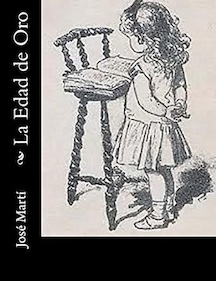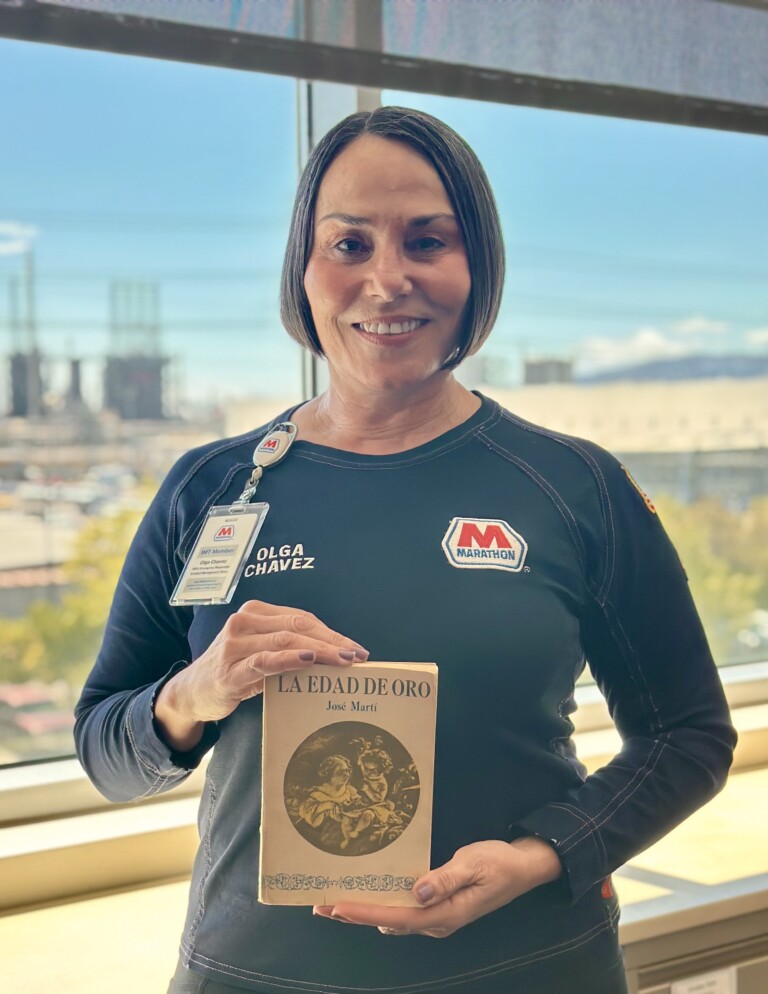Long Beach Leaders are Readers: Olga Chavez, Empowering Community and Corporate Social Responsibility Leader
Top leaders of the world have the exceptional simple habit of reading. Whether for enjoyment or enrichment, reading stimulates the mind and fuels creativity. Long Beach Leaders are Readers features leaders in our community as they share their recommended reads.
In celebration of Mother’s Day and the power of community engagement, Long Beach Leaders are Readers proudly presents Olga Chavez, Corporate Social Responsibility Leader at Marathon Petroleum Corporation, highlighting her philanthropic journey and dedication to empowering Southern California communities.
Continue reading to learn more about Ms. Chavez’s book recommendation and the leader behind it.

La Edad De Oro (The Golden Age)
by
José Martí
Meet Olga Chavez:

What made you choose La Edad de Oro as your recommendation?
This book, La Edad de Oro, holds a special place in my heart because it embodies the spirit of resilience, hope, and the pursuit of knowledge despite adversity. José Martí, a Cuban icon of independence and freedom, first published this book in 1889. For me, this book was not just a collection of stories; it was a beacon of light during challenging times.
Martí’s words, penned in exile, spoke of a Cuba he longed to see—one where children were nurtured with love, educated with wisdom, and inspired to dream boldly. As a Cuban myself, La Edad de Oro reminded me of the importance of preserving my heritage, even when far from home. It taught me to cherish my culture, language, and history, no matter where life took me.
This book resonates with me because it represents the resilience of the human spirit, the power of education, and the beauty of dreaming beyond one’s circumstances. It reminds me that even in the darkest of times, there is always a glimmer of hope, a spark of inspiration that can ignite change and illuminate the path forward.
I believe La Edad de Oro can inspire others by showing them that literature is not just words on a page; it is a mirror reflecting our deepest aspirations and a window into a world of possibilities. It encourages readers to embrace their heritage, celebrate their identity, and strive for a better future, just as Martí envisioned for his beloved Cuba.
Where there any stand-out scenes?
There are several standout scenes and passages from La Edad de Oro that have deeply impacted my life. One of the most memorable passages is from the preface, where José Martí writes about the importance of children and the role they play in shaping the future:
“Los niños, los niños, los niños son. Los niños, los niños, los niños serán. Y entre ellos, en primer término, los pobres, a quienes no es lícito negar cuanto es posible darles: no para compensarles de la herencia de las lágrimas, sino para redimirlos de ella.”
Translated, this passage emphasizes the importance of children, especially those who are less fortunate, and the need to provide them with everything possible, not to compensate them for the inheritance of tears, but to redeem them from it. This passage has resonated with me deeply, reminding me of the responsibility we have to nurture and educate the next generation.
Another impactful scene is the story of “Los Zapaticos de Rosa” (The Little Pink Shoes). This story tells the tale of a poor Cuban girl named Rosa who, despite her humble circumstances, remains kind-hearted and generous. When a wealthy woman passes by and admires Rosa’s beautiful pink shoes, Rosa selflessly gives them to her, even though they are her only pair.
This story is a powerful reminder of the importance of kindness, generosity, and empathy. It teaches us that true wealth is not measured by material possessions but by the goodness of our hearts. “Los Zapaticos de Rosa” has left a lasting impact on me, inspiring me to always be compassionate and considerate towards others, regardless of their background or circumstances.
What do you hope other readers get from reading your book recommendation?
I hope that other readers, like myself, will be inspired by the timeless wisdom and profound insights found in La Edad de Oro. I hope that they will see the importance of education, empathy, and kindness in shaping a better future for all. I hope that this book will encourage readers to cherish their heritage, celebrate their identity, and strive for a better world, just as José Martí envisioned for his cherished Cuba. Ultimately, I hope that La Edad de Oro will ignite a spark of curiosity and compassion in the hearts of its readers, inspiring them to dream boldly and act with courage and conviction.
Did someone read to you when you were a child?
Yes, my brother..
What was the last book you read?
The last book I read was Cien Años de Soledad (One Hundred Years of Solitude). Find it at your local library branch here.
How relevant or relatable are the themes or messages of the book to your own life or to society today?
The themes and messages of La Edad de Oro are highly relevant and relatable to my own life and to society today. The book’s focus on the importance of education, empathy, and kindness resonates deeply with me. In today’s fast-paced and often divisive world, the message of nurturing the next generation, especially those who are less fortunate, is more important than ever.
Additionally, the book’s emphasis on the power of literature and storytelling to inspire change and shape a better future is something that I strongly believe in. In a world where information is constantly bombarding us, the ability to step back, reflect, and appreciate the beauty of language and storytelling is invaluable.
Do you prefer paperbacks or e-books?
I don’t have a preference myself, but many people enjoy the convenience of e-books, while others prefer the feel and experience of reading a physical paperback.
What are your favorite genres to read?
Poetry
Why do you think reading is important?
Reading is crucial because it enhances our learning, understanding of the world, and communication skills. It’s also an enjoyable way to unwind and escape reality. Reading enriches our vocabulary, critical thinking, and empathy, adding depth to our lives. Personally, I’m drawn to poetry because it provides a distinctive and compelling means of expressing emotions, ideas, and experiences.
If you wrote a memoir, what would the title be?
Embracing the Rainbow: A journey from Habana to Hope
Olga Chavez is the Corporate Social Responsibility and Public Relations Lead for Marathon Petroleum Corporation in Southern California, including the Los Angeles Refinery. For the past 12 years, Olga has been responsible for overseeing the management of a multi-million-dollar philanthropy budget to support local non-profits and the communities they serve. Olga works with the Marathon Leadership Team to develop and implement priorities and strategies for achieving balanced public policy and a consistent approach to ensure impactful community investment and outreach, and employee volunteerism.
Olga Chavez was born and raised in Cuba. She and her family immigrated to the United States 40 years ago. She comes from humble backgrounds, her father was a chef, and her mother a caregiver. Her beloved brother passed away not long after their arrival in the United States.
Olga has been very involved in the nonprofit world. Working within the energy industry has enabled her to establish several nonprofit organizations in the community. Some of the foundations formed by Olga are the Wilmington Coordinating Council, under the leadership of the late Shirley Atencio, Gulf Avenue Elementary PTO, and the Friends of the Rotary Club of Wilmington. Olga firmly believes in giving back to the community, and Marathon supports her efforts. She is engaged in several nonprofit boards, such as the Wilmington and Gardena-Carson YMCAs, the Rotary Club of Wilmington, and the San Pedro and Wilmington Chambers. Additionally, she is a member of the President’s Advisory Board – Special Advisors to the Battleship IOWA Museum.
Find “La Edad de Oro” at the library soon!